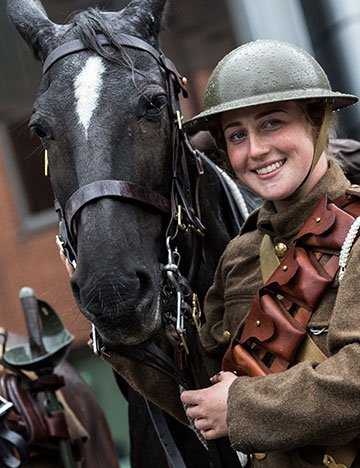Army Reservist treks to Belgium for working equines
Freja Galliven trekked for seven days in full WW1 kit and raised £700 for Brooke.

Twenty-three-year old Army Reservist Freja Galliven was one of 70 international riders from across the globe (Canada, Sweden, Australia, Russia, Germany, Switzerland, Austria and Britain) who took part in a commemorative trek organised by the International Cavalry Association in memory of the last cavalry offensive of 1918 and the end of WW1.
Freja, who lives in Henley-on-Thames, raised over £700 for Brooke.
She said: “I have always been infatuated with horses ever since I was a little girl. The world of working horses was first introduced to me through my grandfather. He relied upon them heavily to earn a living through ploughing fields and dragging cut down trees off the snow-covered mountains in the north of Sweden.”
Freja, a Signaller in the 94 Berkshire Yeomanry, Royal Corps of Signals, embarked on her trek on 15 September and arrived in Mons, Belgium seven days later having ridden 30-40km a day at ‘cavalry pace’ in full WW1 kit.
One thing I learnt from my grandfather was that these magnificent beasts should be treated with respect and gratitude for the unrewarding work they do for us.
She continues: “One thing I learnt from my grandfather was that these magnificent beasts should be treated with respect and gratitude for the unrewarding work they do for us.”
Freja’s horse for the trek was Jazella, a 16.1 hand ex-trotter who’s around 17 years old. “This mare proved herself to be diverse and capable of taking on any challenge. Saying goodbye to my black beauty [at the end of the trek] was heart breaking, and I cannot imagine the pain the soldiers went through having to shoot their equine comrades at the end of the war because they could not take them home. This is one of the many reasons why I wanted to raise money for Brooke.”
This year Brooke is marking 100 years since the end of WW1 with its Every Horse Remembered campaign. Eight million horses, donkeys and mules died during the war, not only from fierce shellfire and gas attacks but also from the extreme conditions they had to endure.
Today, 100 million equines work in punishing environments. Brooke works around the world with owners, local service providers and governments to bring about last lasting improvements for these animals.
You can donate to Freya's challenge by visiting her JustGiving page.
